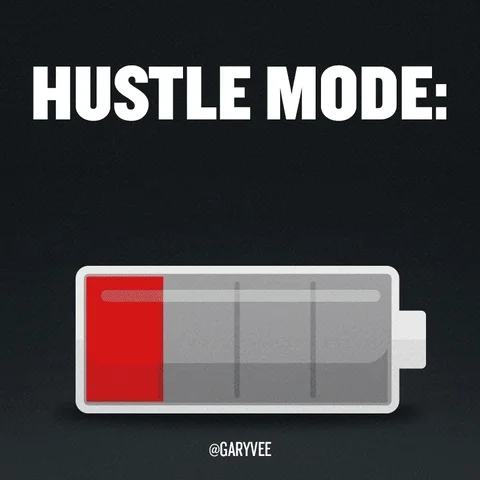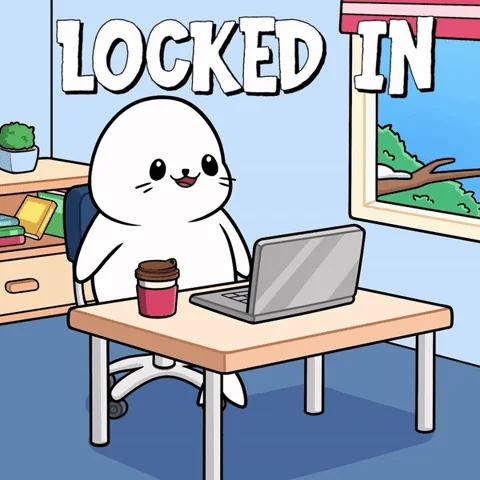Your alarm goes off at 5 AM. #RiseAndGrind ☀️
After chugging a coffee and squeezing in a quick workout, you start another long day at work filled with meetings. You're the last to leave the office and feel exhausted. But it should all be worth it. That promotion has your name on it!
Who needs sleep when you’re setting yourself up for success?

If this sounds familiar, then you or someone you know is probably part of hustle culture. Hustle culture is all about working hard and striving for success, but not without a cost.
Understanding the benefits and pitfalls of hustle culture can help you decide how to approach your work and life.
What Is Hustle Culture?
Hustle culture (a.ka. "grind culture") supports the idea that you can do or get anything you want if you work hard enough. Hustle culture views the label “workaholic” as a badge of honor.

Hustle culture became popular in the 90s with the boom of entrepreneurship and Silicon Valley tech companies, like Google and Facebook, taking over. Overworked staff was the norm at these companies. They set the bar for innovation and inspired many people to put in 110% to achieve their dreams.
 Signs of Hustle Culture
Signs of Hustle Culture
You're probably participating in hustle culture if:
You rarely take days off. And when you do, you often feel guilty about it.
You're a multi-tasker. Why settle for one thing when you can accomplish 3 tasks at a time? For example, you eat your lunch while answering emails and preparing for upcoming meetings.
You have "a lot on your plate." You rarely say no when someone asks you to do something.
You spend more time at work than at home or with friends/family. You work early, late, and/or on weekends.
Quiz
Which of the following matches hustle culture? Select all that apply:
Advantages of Hustle Culture
Hearing or seeing how much a person in hustle culture can do in a day is truly impressive. Fans of hustle culture mention pros such as:

Productivity
Hustle culture pushes people to achieve more. For example, instead of spending weekends lying on the couch watching TV, many people make extra money running their own small businesses (e.g., an Etsy shop or as a content creator).

Motivation
Hustle culture inspires people to take action to accomplish their goals. Believing that there are no limits makes them go above and beyond, setting and achieving high standards.

Success
People in the hustle culture are very focused on advancing their school and/or work careers. They put in the work to put themselves on the road to success.
Drawbacks To Hustle Culture
Many people argue that hustle culture is actually toxic since all work and no play is not a sustainable approach. Negative side effects of grind culture include:

Increased Anxiety
Hustle culture can create a stressful environment. People may feel pressured to be constantly on-the-go and productive. They might worry about their progress and even feel guilty about taking breaks or doing things that aren't related to work.

Burnout and Health Issues
There’s a reason why hustle culture is also known as “burnout culture”. Constantly pushing yourself to do more and work harder usually leads to burning out. It can be easy to forget to slow down and take care of yourself, which can then take a toll on your health — both physical and mental.
Check out this Byte for strategies to avoid work burnout, such as setting clear work boundaries.

Less Work-Life Balance
When you prioritize work and your goals, it’s easy to get tunnel vision and ignore everything else. You might feel like all you do is work, leaving little or no time to spend on relationships or hobbies.
To Hustle or Not to Hustle?
Many people still subscribe to hustle culture as a way to motivate themselves to achieve their goals. While still common in certain workplaces, many people have opted out and criticized this way of life.

For example, many young people believe that it supports toxic and outdated work conditions. After seeing the generations work before them, many feel that in most cases, people are overworked just to be undervalued.
During the pandemic, people from all generations have also shown less support for hustle culture once they re-evaluated their priorities. A 2022 survey by Prudential showed that 70% of workers prioritized or considered "prioritizing their personal lives over their jobs and careers."
Case For Hustle Culture
Hustle culture may appeal to you if:
You have ambitious goals for yourself.
You're willing to sacrifice rest and personal time for the sake of your career.
You enjoy a fast-paced life and working environment.
Case Against Hustle Culture
Hustle culture isn't for you if:
You love your "chill time".
You consider your work to be "just a job".
You believe life is about spending time with loved ones or on your hobbies/interests.
You prefer a slower pace when it comes to life and work.
Knowledge Check
 Read the following case studies and decide who would appreciate hustle culture the most:
Read the following case studies and decide who would appreciate hustle culture the most:
 Lisa is a young chef. Her life dream is to get a Michelin star. She currently works at a trendy new restaurant and has a home catering business.
Lisa is a young chef. Her life dream is to get a Michelin star. She currently works at a trendy new restaurant and has a home catering business.
 Jennie is a dental hygienist. She has consistent hours, but doesn’t really like her coworkers. In her spare time, she runs marathons.
Jennie is a dental hygienist. She has consistent hours, but doesn’t really like her coworkers. In her spare time, she runs marathons.
 Ross works as a copy editor. He enjoys working from home and has many hobbies, including baking.
Ross works as a copy editor. He enjoys working from home and has many hobbies, including baking.
 Javi works for a tech start up. He occasionally works late, but tries his best to maintain a good work-life balance.
Javi works for a tech start up. He occasionally works late, but tries his best to maintain a good work-life balance.
Quiz
Which of these people would appreciate hustle culture the most?
Take Action
 It’s time to decide your next step! Will you embrace the ambitious lifestyle of hustle culture? Or do you reject that idea and prefer to strive for balance over success?
It’s time to decide your next step! Will you embrace the ambitious lifestyle of hustle culture? Or do you reject that idea and prefer to strive for balance over success?
Your feedback matters to us.
This Byte helped me better understand the topic.


